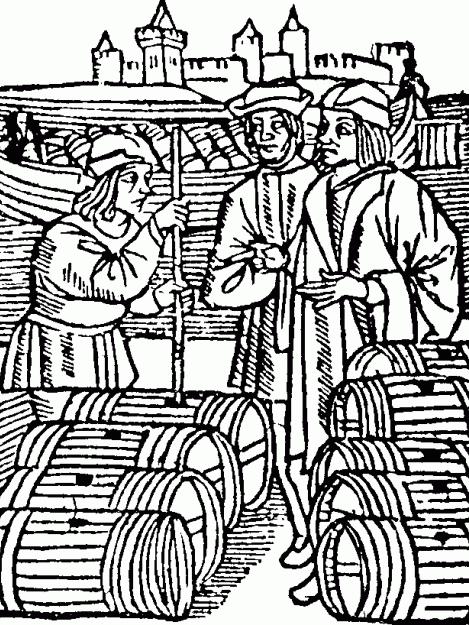Trade development is the most important source of primary capital accumulation by merchants and usurers for the formation of a full-fledged money market. In the process of development of trade and in order to simplify the conduct of trade operations, various forms of merging merchants arose. The association of merchants of German cities could be called differently, depending on the purpose for which this union was created. Such associations could pursue various goals.
Trade in Northern Europe
Northern Europe traded in fish, furs, wood, beer, amber and other goods common in its territories. Such states as the Principality of Polotsk, the northeastern lands of Russia, the Novgorod Republic, the Commonwealth, the kingdoms of Germany, Brabant, the northern territories of France and England, and the countries of Scandinavia participated in trade. The main trading operations were carried out at fairs. But harsh feudal conditions did not facilitate the establishment of trade operations, and various taxes and exorbitant tolls markedly complicated foreign trade.

Intensive market relations required mechanisms for successful sales and reliable logistics, and hence associations that could fulfill these requirements. Special royal decrees allowed large merchants and associations of merchants to offer their goods on preferential terms. Gradually, private trade was supplanted by various forms of merger associations. By necessity, various trade associations arose on the territories of Germany and other European settlements, known to us under such names as guilds, convoys, and the Hansa.
Guild
The guild was called the association of merchants of German cities for joint professional interests. The large cities of Northern Europe numbered several dozen guilds. Each of them had its own status, set prices for its products, and every medieval merchant had the right to protect their interests in the guild. Trading companies in their activities were guided by the charter, each of them was under the guidance of its patron, had its own patron saint. Members of the guild had their own representation in the city authorities to protect their own commercial interests.
Convoy
A convoy is a temporary association of merchant unions to ensure the safety of goods transported by sea. Convoys were formed on the basis of the unit system. Each merchant contributed a certain amount for the chartered vessels and security services.
Hansa
The union of merchants of German cities, or rather many of them, soon began to create associations between different cities - not only Germany, but also its trading partners. By the middle of the 13th century, a trade and political union of merchants of the North European cities. In the chronicles, it is known as the Little Hansa. This form of trade relations was unusually attractive, and by the beginning of the 15th century, about 170 European cities were part of the Hanseatic League . What kind? The association of merchants of German cities had their representative offices in Gdansk, Riga, Lviv, Veliky Novgorod, and also created several branches to streamline trade relations. The leading city was Lübeck, who headed the Vendian Hansa, and later Hamburg. Until the beginning of the 17th century, the Vendian Hansa had the largest trade turnover in all of Northern Europe. The second most important was the Hansa of Paris.
Hansa Merchants Privileges
The association of merchants of German cities provided their participants with such a benefit that traders sought to become members of this union at all costs, despite the rather large regular fees. Membership in the Hansa guaranteed that:
- goods belonging to the Hanseatic merchant will not be confiscated for non-payment of duties or taxes, will not be taken away for debts to other private individuals ;
- merchants did not have the right to arrest for crimes committed in other cities, it was also forbidden to partially or fully confiscate goods for military purposes;
- merchants were not responsible for the actions of companions; each of them was personally responsible for the quality and delivery of the goods, and each was entitled to a fair price;
- the property of the deceased merchant was transferred to his executors; the authorities did not have the right to collect goods and other property of the deceased merchant;
- members of the Hanseatic Unions enjoyed a protectorate of local authorities, some taxes and customs duties were canceled for them;
- Members of the Hanseatic League had the right to protection from violence and robbery by feudal lords, pirates and local authorities.
Thus, the Hanseatic League stimulated the development of trade relations, developed mechanisms for the protection of merchants and strengthened economic ties between European nations.